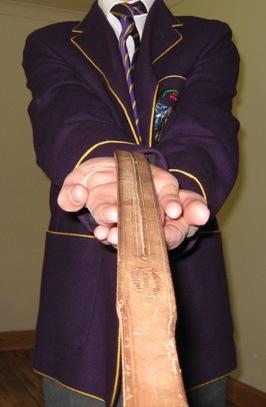South Korea debates students discipline
(Photo: Greyschoolshorts)
By Jason Strother
Cho Eun Ae has a searing memory from high school. The 23-year-old South Korean recalls when she was a freshman, a teacher got really angry with her for chatting with a friend during class.
“He shouted, open your hand! I opened my hand and he smashed it with a stick,” she said. “I don’t remember how many times, but it hurt a lot.”
Many Koreans have had a similar experience. Teachers were permitted to wield what many euphemistically called the stick of love. Corporal punishment was seen as a part of Korea’s Confucian educational tradition.
ҬBut some teachers took it too far. Ҭ ҬLast year, a student used a cell phone to secretly video the beating of a classmate at the hands of his sixth grade teacher. In the video, the teacher pushed and punched the boy, as other kids looked on.
The video went viral, and many parents, students and teachers were horrified. “¨The teacher in question lost his job, but did not face criminal charges. Soon after, Seoul’s Department of Education forbade corporal punishment. On March 1st, the beginning of the school year in Korea, a nationwide ban went into effect.
ҬBut the prohibition has left some educators struggling to find alternative ways to maintain order in the classroom. Ҭ ҬRa Dong Chul, principal of the Jung-ang all-girl high school in Seoul, said he supports the ban on corporal punishment, but there are indirect ways to physically discipline students.
“¨For instance, students could be made to stand up for long periods of time during class, he said, or they could run laps around the school’s playground or pick up trash in the neighborhood.
“¨Ra said those methods are allowed under the Ministry of Education’s new disciplinary guidelines. The government has also said that forcing students to do push-ups is acceptable.
“¨But Ra said he isn’t going to implement those tactics right away, in part, because the Seoul school district and many others don’t agree with the Ministry’s new guidelines.
Indirect physical discipline isn’t any better than corporal punishment, according to Dong Hoon Chan, a committee chairman at the Korean Teachers’ and Education Workers’ Union.
“We support non-physical discipline,” Dong said, “like sending kids to a self-reflection room or having the students go on a mountain hike with their teacher to help improve their communication.”
ҬDong said that while he supports the ban, he thinks the Ministry of Education should have had more discussions with teachers on how best to control their students before it took effect.
But some students say the ban was a mistake to begin with. ҬӬAccording to18-year old Park Bum-jun, teachers have been left with no authority, and bad kids are taking advantage of it.
“¨”Since the ban, kids hit their teachers because they know they can get away with it. I know the ban was supposed to protect a student’s human rights, but it’s really hurting the teachers rights now,” Park said.
Ҭ17-year old Lee Chun Joo agrees.
“I think our society needs some kind of punishment to make students change their behavior,” she said. “Teachers didn’t hit students out of anger; it was to make them better students. They want their students to succeed. This was our tradition”
ҬIt was for those reasons, she said, that the stick of love got its name. Ҭ
We want to hear your feedback so we can keep improving our website, theworld.org. Please fill out this quick survey and let us know your thoughts (your answers will be anonymous). Thanks for your time!
